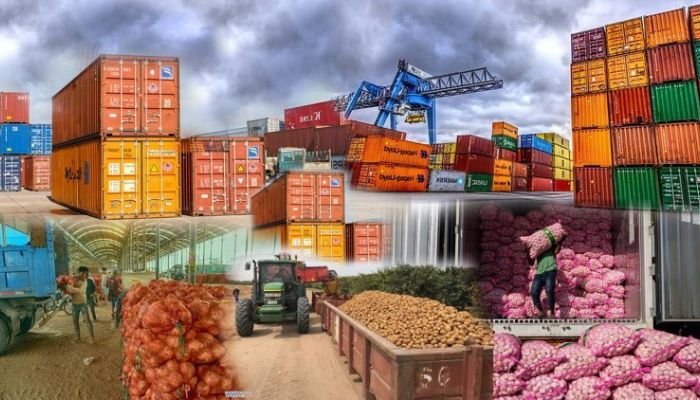In April 2024, a Nigerian exporter moved a container of food products from Aba in South-East Nigeria to Apapa Port in Lagos.
The container arrived in Lagos three days after as it fell three times on the road due to the proliferation of potholes and manholes.
The 33-year-old exporter confirmed to BusinessDay that he spent over N300, 000 on police and Customs officers as well as on more than 14 groups of touts, popularly called ‘agberos,’ between Aba and Lagos.
Read also: Nigeria’s non-oil export hit record $1.7b, highest in 49 years- Presidency
On getting to Lagos, he found that containers clogged the streets of Apapa into the port. He was unable to ship his products until five days later.
“We have had situations where our products changed forms and taste before getting to their destination in the United States,” the exporter, who pleaded not to be named, said.
Multiple taxes and levies, bad roads and clogged ports are hindering the growth of the nation’s non-oil exports, crimping their capacity to drive foreign exchange (FX) earnings into Nigeria.
Apapa and Tin Can ports have particularly been a clog in the wheel of exporters’ progress for several decades. In 2017, about 25 percent of cashew nuts exported from Lagos to Vietnam in 2017 were downgraded owing to delays at Lagos ports, according to a report by the Lagos Chamber of Commerce and Industry (LCCI).
The report noted that about 5,000 trucks seek access to Apapa and Tin Can ports every day even when the ports were originally meant to accommodate only 1,500 containers.
Over the last year, rail transport appears to have got a new lease of life in Nigeria. However, much of Nigeria’s transportation is done by road, and the infrastructure remains inadequate and in poor condition for most parts.
A 2022 report by the World Bank report estimated that Nigeria loses about $1 billion annually to poor road infrastructure.
Obiora Madu, director-general of the African Centre for Supply, said logistics affects every industry in Nigeria and its competitiveness.
Madu, who is also an export consultant, stressed that the country’s export drive can only be successful with adequate infrastructural facilities such as good road networks, storage facilities and rail, among others, to drive competitiveness.
According to him, the economic losses due to logistical challenges, which for many businesses are among the biggest nightmares, could remain for a very long time until rail transport is purposively designed to move cargo
The Nigerian Institute of Quantity Surveyors said in 2024 that 56,000 to 60,000 public and private construction projects, estimated at N12 trillion, were abandoned. The majority of the projects were road construction.
Jude Nneji, managing director, ABC Transport Company, said the biggest challenge the firm faces in moving goods across the country is the poor state of road infrastructure, noting that most roads are not accessible.
“Some of the roads, like going from Owerri to Calabar, which ordinarily is supposed to be a one-and-a-half-hour journey, take an average of 6-7 hours, often worsened by law enforcement and revenue agents on the road, thereby stoking multiple taxation,” he said.
Nneji urged governments at all levels to invest in fixing road infrastructures and address the issue of multiple taxation.
According to him, after a few days of heavy rainfalls, most communities become impassable, leading to high prices of commodities across the country.
Port makes agric products less competitive
Nigeria’s non-oil export sector continued its growth trajectory in the first quarter (Q1) of 2025, recording a 24.75 percent increase compared to the same period in 2024, said the Nigerian Export Promotion Council (NEPC).
Cocoa, cocoa butter, cocoa liquor, and cocoa cake topped the list of the top-20 exported products.
Experts say while the number is impressive, it can be bigger with better infrastructure and fewer port hassles.
They say that port congestion makes exporters’ transaction cycles longer than necessary, leading to late contractual obligations and incurring higher costs.
“Addressing rail connectivity, port upgrades, and eliminating bottlenecks like role overlaps and security costs will help unlock Nigeria’s full potential in the global market,” said Taiwo Fatoyinbo, container management and logistics expert.
“We can look to examples like Singapore, a global logistics hub and one of the world’s largest transhipment ports, for inspiration,” Fatoyinbo further said.
She noted that if Nigeria takes shipping and logistics seriously, it could become a major contributor to the economy, generating jobs in transportation, warehousing, freight forwarding, and more.
She also said that expanding rail connections from Apapa to the South-East and South-South is essential for balancing logistics across Nigeria, noting that underutilised ports in Calabar and Port Harcourt require modernisation to alleviate pressure on the Lagos ports and to meet global standards.
Read also: Data, logistics stall Nigeria’s non-oil exports push
She added that repetitive checks by agents and role overlaps within the system continue to cause delays and open doors for potential extortion.
“Once an agent completes the clearing process, Customs should not stop cargo unless there is a specific investigation. Shipping companies should not bear the responsibility of verifying Customs’ documentation, as the agency is the final authority.
“To ensure safe delivery, many importers resort to security agents like police escorts, which significantly increase transportation costs, particularly for smaller businesses. This added cost directly impacts the overall price of goods,” Fatoyinbo said.
She noted that developments like Dangote’s port project in Ogun State signal a bright future for Nigeria’s logistics industry, one that could rival global competitors and elevate the country’s economic standing.

